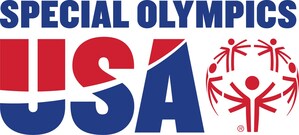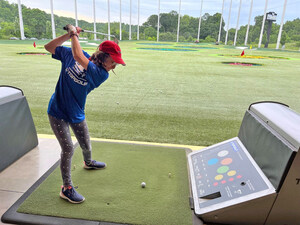Special Olympics Narrows Health Gap Faced by People with Intellectual Disabilities
Thousands in nine countries received free health care through Healthy Communities initiative.
Global campaign to expand to 100 Healthy Communities by 2025 announced.
WASHINGTON, Nov. 19, 2014 /PRNewswire-USNewswire/ -- Special Olympics released data today outlining the results of its successful two-year old Healthy Communities initiative and announced that it will expand the program from 14 to 100 sites by 2025.
Healthy Communities provides essential health services to people with intellectual disabilities, a population that is severely medically under-served, despite the plethora of health organizations and programs that exist to serve people in need.
In addition to announcing the program's expansion, Janet Froetscher, Chief Executive Officer of Special Olympics, said that top disability and global health and development experts will convene at UNICEF Headquarters in New York City on December 10 to develop a global campaign to increase the inclusiveness of global development programs and reduce health disparities for people with intellectual disabilities.
"Thousands of people got care that would not have, thanks to Healthy Communities," said Tim Shriver, Chairman of the Board of Special Olympics. "Thousands would have suffered in silence and never reached their full potential because there wasn't a doctor in their community willing or able to treat a patient with an intellectual disability or because they weren't invited to line up with the others when dental, vision or hearing exams were offered at schools and clinics."
The goal of Healthy Communities is to help people with intellectual disabilities access health care in their communities and improve their health status.
Special Olympics launched Healthy Communities in 2012 at the Clinton Global Initiative with a $12 million gift from businessman and philanthropist Tom Golisano. Since then dozens of international and local partner organizations have stepped up to support the program as well, and the US Centers for Disease Control and Prevention also provides significant funding for the program in the US. The program is currently underway in 14 sites including six U.S. states (Arizona, Florida, Kansas, New Jersey, New York and Wisconsin) and eight other countries (Kazakhstan, Malawi, Malaysia, Mexico, Peru, Romania, South Africa and Thailand).
People with intellectual disabilities get less, lower quality or often no health care and experience higher rates of preventable disease, chronic pain and premature death. It is a situation that exists in rich and poor countries, and one that Ann Costello, Director of the Golisano Foundation, calls "a hidden global health crisis."
Highlights of Data from Year Two of Healthy Communities
In just two years, by offering health clinics in remote villages, partnering with governments, businesses, universities and community organizations, training people with intellectual disabilities to be peer health educators, and more, Healthy Communities has:
- Provided 52,424 free health examinations at 404 clinics, in seven health areas such as vision, hearing, and oral health;
- Linked 2,187 people to treatment for serious health conditions discovered through the free examinations;
- Offered health examinations and clinics in 116 new locations around the world, where people would not have had access to care otherwise;
- Trained 11,882 health care professionals to provide on-going, community-based care for patients with intellectual disabilities;
- Trained 382 Special Olympics athletes to be health educators for other people with intellectual disabilities;
- Delivered health education on locally-relevant topics such as healthy weight, HIV and AIDS, and malaria to 18,292 Special Olympics athletes, their families and coaches; and
- Engaged 9,884 people with intellectual disabilities in health education opportunities such as fitness clubs and cooking classes.
Froetscher said, "Year 2 results confirm that we are on the right track to ensuring improved health access and status for people with intellectual disabilities through a community-based, cost-effective and sustainable approach. Our goal now is to expand this initiative from 14 to 100 Healthy Communities in Special Olympics programs around the world by 2025."
Guidelines and criteria as to how to replicate the success of the pilot sites and become a Healthy Community have been made available to the 220 Special Olympics programs that serve 4.4 million athletes in 170 countries.
"People may not know," added Costello, "that Special Olympics is the largest public health organization in the world focused on people with intellectual disabilities. No other organization has the ability to reach millions of people with intellectual disabilities. That's why we partnered with them on Healthy Communities.
"Unless people can access quality care on an ongoing basis in their communities, their health will remain in jeopardy and they will be unable to be productive citizens. We can do this−one community at a time−by increasing awareness; not tolerating our most vulnerable citizens living in pain; and helping to make health systems more inclusive, from medical schools to doctors' offices, to clinics and hospitals."
Froetscher said some of the ways change can occur is for Health Ministries to adopt new policies; hospitals and healthcare networks to offer follow-up care; gyms to improve access to their facilities; and doctors, nurses, dental hygienists, and other health professionals to volunteer with Healthy Communities.
About Healthy Communities
The Healthy Communities initiative builds upon the Special Olympics Healthy Athletes® program, which has provided free health examinations in seven disciplines, usually at Special Olympics events, since 1997. Healthy Communities is an on-going, comprehensive, community-based effort, rather than an event-centered program. It works in the community, building partnerships and engaging health workers to expand health and fitness services for people with intellectual disabilities in order to narrow the persistent health disparities they face. The Healthy Communities initiative enables Special Olympics to serve more athletes in harder-to-reach locations in a cost-effective and sustained manner, improve access to follow-up care, and address local health challenges such as obesity, malaria and HIV/AIDS.
About Special Olympics
Special Olympics is a global movement that unleashes the human spirit through the transformative power and joy of sports, every day around the world. We empower people with intellectual disabilities to become accepted and valued members of their communities, which leads to a more respectful and inclusive society for all. Using sports as the catalyst and programming around health and education, Special Olympics is fighting inactivity, injustice and intolerance. Founded in 1968 by Eunice Kennedy Shriver, the Special Olympics movement has grown to more than 4.4 million athletes in 170 countries. With the support of more than 1.3 million coaches and volunteers, Special Olympics delivers 32 Olympic-type sports and more than 81,000 games and competitions throughout the year. Special Olympics is supported by individuals, foundations and partners, including the Christmas Records Trust, the Law Enforcement Torch Run for Special Olympics®, The Coca-Cola Company, The Walt Disney Company and ESPN, Lions Clubs International, Mattel, , P&G, Microsoft, Bank of America, Essilor Vision Foundation, the B. Thomas Golisano Foundation, Finish Line, The Safeway Foundation, and Safilo Group. Visit Special Olympics at www.specialolympics.org. Engage with us on: Twitter @specialolympics; fb.com/specialolympics; youtube.com/specialolympicshq, instagram.com/specialolympics and specialolympicsblog.wordpress.com.
About B. Thomas Golisano
B. Thomas Golisano, an entrepreneur, philanthropist, and civic leader, is Chairman of Paychex, Inc., a national leader in the payroll and human resource industry. He has demonstrated ongoing generosity and commitment to numerous non-profit organizations and has been recognized for his achievements and endeavors by many organizations and national publications. The Golisano Foundation, which he established in 1985, is the nation's leading foundation dedicated exclusively to helping organizations that assist people with developmental disabilities. In addition to the Foundation's contributions, Mr. Golisano has been very generous to many other institutions and organizations, his philanthropy totaling more than $200 million. For more information see golisanofoundation.org.
SOURCE Special Olympics
Related Links
http://www.specialolympics.org
WANT YOUR COMPANY'S NEWS FEATURED ON PRNEWSWIRE.COM?
Newsrooms &
Influencers
Digital Media
Outlets
Journalists
Opted In





Share this article